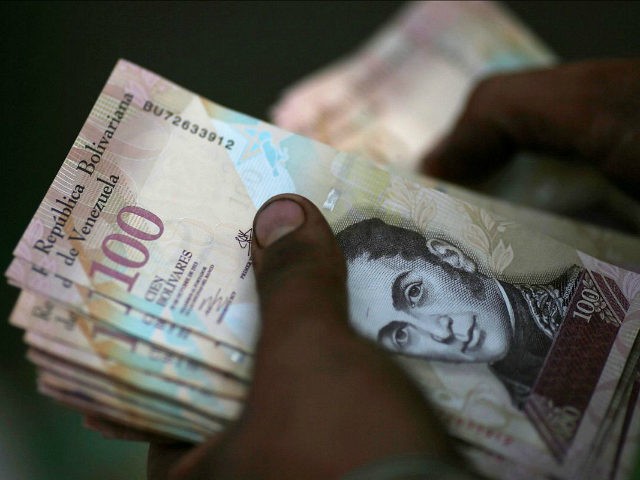Venezuelans are looting shops, desperately lining up at banks, and burning their highest-denomination bolívar bills following a failure by President Nicolás Maduro to distribute new bills in light of the nation’s official descent into hyperinflation.
In the state of Anzoátegui, reports surfaced of desperate Venezuelans unable to enter their banks and deposit their 100 bolívar bills before they became worthless on Thursday. Failing to trade them in for the new currency, they began burning the money in front of their local Bank of Venezuela branch, according to local newspaper El Nacional.
#16D En Anzoátegui, el pueblo quema los billetes de Bs. 100 frente al Banco de Venezuela – @anzoategui_act pic.twitter.com/LPurDGtx8Z
— Reporte Ya (@ReporteYa) December 16, 2016
In Bolívar state, Venezuelans unable to access their regular paychecks due to the long lines at their banks looted a local market. While lootings have become commonplace due to Maduro’s implementation of a Soviet rationing system, which has left many supermarkets with little to no supplies of basic goods, the Venezuelan site La Patilla notes that the Bolívar state reports are directly related to the currency change.
Reportan saqueos de comercios en la población de El Callao en el edo Bolívar #16Dic pic.twitter.com/gwMA54fEue
— Jensser Morales (@JMoPeriodista) December 16, 2016
In Boconó, lines to return the forbidden bills to the bank in exchange for valid currency were so long — in the middle of Venezuela’s dry season — that some elderly people reportedly fainted while waiting in line outside to enter their banks.
Maduro announced the change in currency in early December. The 100 bolívar bill was to be replaced by six new denominations worth between 500 and 20,000 bolívars to reflect the plummeting value of the currency. Between December 13-15, Venezuelans were ordered to return their 100 bolívar bills to banks and promised they would receive valid currency in exchange, including a 100 bolívar coin, but the larger denomination bills have yet to arrive.
The result has been chaos in many of the nation’s banks. Individuals trying to use ATMs to return their 100 bolívar bills received 100 bolívars in return, their time in line worthless. Online banking services for most Venezuelan banking institutions were down, or working extremely slowly, prohibiting users from accessing their December 15 paychecks even outside of the hard currency form. Some were fortunate to receive valid money, but in outrageously inconvenient form – the Argentine outlet Infobae notes that some received 10,000 bolívars ($15) in five and ten dollar bolívar bills.
Some were fortunate to receive valid money but in outrageously inconvenient form — the Argentine outlet Infobae notes that some received 10,000 bolívars ($15) in five and ten dollar bolívar bills.
Maduro announced the change in currency as a way to combat an alleged conspiracy by the United States Department of Treasury and the “Miami mafia” of Venezuelan exiles to undermine the value of the bolívar. The bolívar has been significantly damaged by Maduro’s socialist regulation: strict price controls, prohibition on corporations acquiring a variety of imports necessary for manufacturing, and free crude oil giveaways to Venezuelan state allies like Cuba.

COMMENTS
Please let us know if you're having issues with commenting.